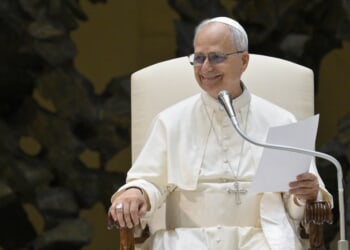Mike Newton was Conservative parliamentary candidate for Wolverhampton West, and worked for the Bank of England during his career in the financial markets.
Bond and currency markets thrive on the boring stuff. Predictability. Credibility. A lack of drama. Steady, sensible types running the show. People who can commit to something then deliver it. In other words, confidence.
Last week these markets declared no confidence in the Government’s economic policy, triggered by the scenes at PMQs as the Prime Minister failed to endorse the Chancellor and defend his fiscal policy (although the rot had set in way before that).
Investors began to vote with their feet, and fast. At one point, gilt yields rose nearly a quarter of a percent in minutes, a huge move, before settling down from those highs into the close as short-term traders took profit.
But the shifts were truly violent, typical of a situation where confidence is evaporating, and the pound moved significantly lower versus both the dollar and Euro. This price action was not quite up there with the moves experienced during the Truss budget, but the spike in volatility and change in sentiment was very similar.
The markets have now woken up and are in full vigilante mode. The re-pricing of gilts and sterling will likely continue now confidence is badly damaged. A crisis is rarely a one-day event.
Let’s dig a little deeper into specifics. Why has this happened, and why now?
First, let’s be clear: this is not about a loss of confidence in the Chancellor. Frankly, and this is not meant to be unkind, I don’t think investors care whether Rachel Reeves stays or goes, despite the post-PMQs clarification. (Although speaking to a leading central banker this afternoon, who described her as ‘being like a football manager who’s received a vote of confidence’, most people probably expect the latter.)
She is not the issue. The problem is a loss of confidence in the whole economic project and the Government’s ability to deliver even small parts of it. It does not matter whom the Chancellor is when this type of shift occurs.
Markets have been relatively kind to Labour both on its way into office, and during it, despite the erosion of fiscal buffers and introduction of anti-business legislation like the Employment Rights Bill (fair play to Andrew Griffith for his bulldog-like evisceration of the latter). Investors have been more than fair to it.
There was extensive pitch rolling pre-election. Reeves and Sir Keir Starmer both went to great lengths to offer the markets reassurances that the party had abandoned Corbynomics, and would be both fiscally responsible and respectful of business. This worked; those big investors, that control the money the UK needs to borrow, generally believed them.
(And need to borrow it we do, being a ‘double deficit’ country with neither a budget nor current account surplus. In 2024 the budget deficit was 4.8 per cent of GDP and the current account 2.7 per cent. These are serious numbers.)
Those pre-election assurances have proven to be worthless, eroded by multiple u-turns on things that matter and a sense among investors that the executive is hostage to the legislature. To be matter-of-fact, the promises made over breakfast in New York and cocktails in Singapore have not survived contact with the party’s dominant urban progressive activist base.
For investors, the smell of populist leftism is in the air, fanned by the cultural chaos in the country (which makes people doubt our sanity, never mind fiscal and monetary stability). These things matter for the perception of stable government that markets crave.
The crux of the issue is this: markets assumed that Labour would be able to reduce public spending. They no longer do. The numbers involved in the Universal Credit and Personal Independence Payment Bill were very small, at just £5 billion versus total government expenditure of £1.2 trillion, but the principle was what mattered. The same is true of the Winter Fuel u-turn.
If spending cannot be controlled then there will have to be more gilt issuance, or higher taxes, or both. More issuance will be at higher interest rates, as markets demand a greater risk premium. And higher tax is not a cost-free option, either politically or economically.
There is a growing realisation that Labour is anti-business and unable to create growth. So its opportunities to tax what it cannot create are by definition very limited. And as both the Laffer Curve and common sense experience show, higher tax rates ultimately destroy revenue.
The assumption you make when lending to a government is that you can be confident in its stewardship. That confidence was lost last Wednesday, and there is no realistic prospect of its return, simply because Labour MPs will not permit it. More volatility lies ahead.
I’ll conclude with what this means for my own party: this is an incredible opportunity to win back low-attachment Reform voters by showing that we are the party of serious solutions to complex problems.
(By low-attachment I mean a type we will almost certainly know from our own experience: the decent, ‘solid citizen’ slightly right-of-centre voter who gave up on us out of sheer frustration in the GE and 2025 locals, but isn’t quite convinced by what he or she sees from Reform, although they like Nigel Farage personally.)
These voters are not stupid, and if Reform cannot provide answers to the issues the nation faces beyond heuristic populism, these supporters will have no choice other than to give the Tories another look. It is up to us to make the most of that chance.




![Steak ’n Shake Mocks Cracker Barrel Over Identity-Erasing Rebrand [WATCH]](https://www.right2024.com/wp-content/uploads/2025/08/Steak-n-Shake-Mocks-Cracker-Barrel-Over-Identity-Erasing-Rebrand-WATCH-350x250.jpg)


![Soros Network, Others Behind LA Riots [WATCH]](https://www.right2024.com/wp-content/uploads/2025/06/Soros-Network-Others-Behind-LA-Riots-WATCH-350x250.jpg)

![Mount Rushmore Could Get Trump Upgrade Under GOP Push [WATCH]](https://www.right2024.com/wp-content/uploads/2025/07/Mount-Rushmore-Could-Get-Trump-Upgrade-Under-GOP-Push-WATCH-350x250.jpg)






